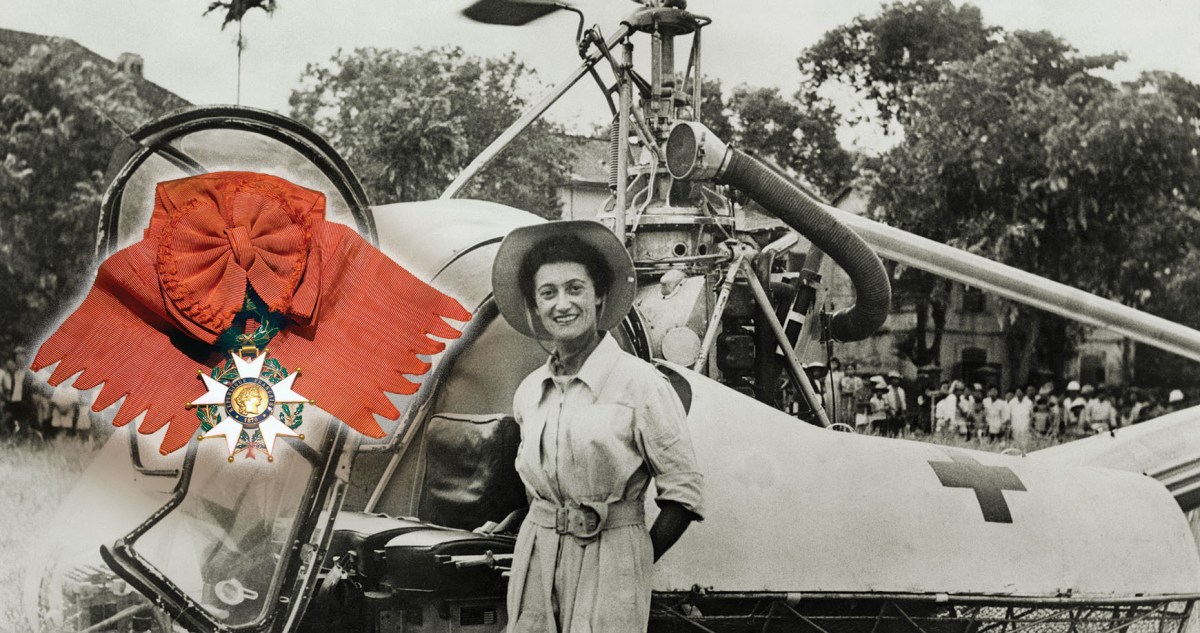Valérie André is a medevac helicopter pioneer—and the first woman to fly a helicopter in combat. For her service in Vietnam she was decorated with the Legion of Honor, the National Order of Vietnam and the Croix de Guerre for valor in foreign operations. She is the first woman to become a general in the French military.
André, born in Strasbourg in 1922, was a member of the French Resistance in World War II. During her time as a medical student after the war, she learned to fly fixed-wing aircraft at a local flying club. In 1948 she graduated from the University of Paris with a medical degree and qualified as a neurosurgeon.
By that time the French were deeply involved in a war with the Viet Minh independence movement in Vietnam, and there was a severe shortage of military doctors there. André joined the French army as a captain, underwent parachute training and was assigned to Saigon as a surgeon at the Coste Military Hospital.
All too often, the wounded reached care far too late, taking days and sometimes even weeks to be transported from jungles to a military hospital. While André was in Saigon in 1950, she witnessed a demonstration of a Hiller 360 helicopter (forerunner of the American OH-23 light helicopter) configured as an air ambulance, with two externally rigged stretchers.
Recognizing the potential of battlefield aerial medevac, André fought the military bureaucracy to return to France to train as a helicopter pilot. Back in Vietnam in 1951, she became one of the first three helicopter medevac pilots, along with Adjutant (Master Sgt.) Henri Bartier and Capt. Alexis Santini—whom she married in 1963.
From 1951 to 1953 André flew 129 combat medevac missions in northwest Vietnam, rescuing 165 wounded soldiers. On two occasions she parachuted into the field to treat wounded soldiers in need of immediate surgery.
In December 1951 André flew in the face of ground fog and heavy anti-aircraft fire to reach the besieged French outpost at Tu Vu on the Black River. On the ground she performed emergency surgery on the most pressing cases and then flew the most seriously wounded to Hanoi, two at a time.
In 1952, André assumed command of the helicopter unit at Gia Lam Air Base in Tonkin province. She also flew medevac missions at Dien Bien Phu. The Vietnamese called her “the woman who comes down from the sky.”
In the early 1960s André served with French forces fighting an Algerian revolution, flying an additional 236 combat missions. As a major she served as the medical chief of the 23rd Helicopter Squadron, flying Sikorsky H-19 and H-34 transport helicopters and Alouette 2 light helicopters.
She also served as the chief medical officer at the Reghaïa Air Base. By the time André was promoted to Medical Corps colonel in 1970, she had a total of 3,200 flight hours.
In 1976 she was promoted to Médecin Général, becoming the first female general officer in the history of France. In 1981, she was made Médecin Général Inspecteur, the senior-ranking medical officer in the French military and a major general.
André was one of the founding members of the French National Air and Space Academy in 1983. Now 98 years old, she lives in Paris.
Over the course of her long career André was awarded the Croix de Guerre five times, the Cross of Military Valor twice, the Aeronautical Medal and the Volunteer Combatant’s Cross for her service in World War II. In 1987 André was the first woman to receive the Grand Cross of the National Order of Merit.
In December 1999 she was awarded the Grand Cross of the Legion of Honor, the highest honor in France and a distinction bestowed on only eight other women, including a 2014 presentation to her Indochina War contemporary, nurse Geneviève de Galard, the “Angel of Dien Bien Phu” at the 1954 battle that ended French rule in Vietnam. V
David T. Zabecki is editor emeritus of Vietnam magazine.
This article appeared in the February 2021 issue of Vietnam magazine. For more stories from Vietnam magazine, subscribe here and visit us on Facebook:






